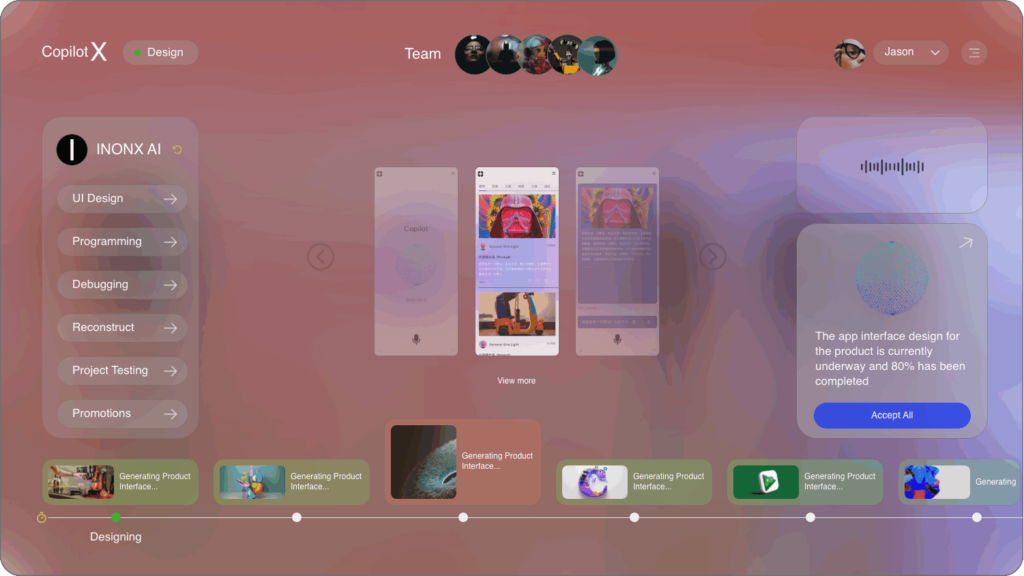Artificial Intelligence (AI) continues to evolve at a rapid pace, shaping industries and everyday life with its innovative power. As of early 2024, numerous advancements have been made in AI technologies, with notable developments in large language models, tools and APIs, and specialized applications. These innovations are transforming sectors such as healthcare, education, business automation, and cybersecurity. In this article, we will explore the most recent progressions and announcements in AI from different angles, emphasizing their functions, potential applications, and overall industry impact.
One of the standout releases in AI large models is Google Gemini 1.5 Pro. This advanced system provides enhanced multimodal capabilities, allowing users to interact with text, images, and audio more effectively than ever before. The revised version significantly improves upon its predecessor, offering extended context understanding that enables the model to make more accurate predictions and generate more coherent responses. The applications of such technology are vast; for example, it could be employed in customer service, legal document analysis, or even creative industries like marketing. As AI-driven engagement becomes the norm, Gemini 1.5 Pro is set to redefine how businesses connect with their customers and clients.
In addition to advancements in modeling, a surge of new AI tools and APIs is emerging across various industries to integrate advanced AI capabilities into everyday tasks. Companies like OPENAI, Microsoft, and IBM are releasing APIs that streamline operations, facilitate data analysis, and enhance user experiences. A prime example of this is the recent partnership between Microsoft and OpenAI, culminating in the integration of GPT-4 capabilities within Microsoft Office applications. This integration is not merely a superficial upgrade; it empowers users to perform complex tasks more efficiently by providing real-time suggestions, automating routine actions, and personalizing experiences based on user behavior.
The healthcare sector is also witnessing significant innovations thanks to AI advancements. Startups are deploying AI tools for predictive analytics, helping identify patient risks and optimizing treatment plans based on individual needs. AI platforms focused on diagnostic imaging are improving patient outcomes by decreasing the time it takes to analyze medical images, consequently allowing healthcare professionals to make quicker decisions about patient care. Such technologies are increasingly essential for achieving higher efficiency and accuracy in developing personalized healthcare solutions.
Emerging technologies in AI are addressing specialized use cases that promise to revolutionize various industries. Among them, the focus on creating more reliable and debiased large language models (LLMs) has gained traction. Companies like Cohere and Anthropic are working towards eliminating biases that have historically plagued AI systems, ensuring fairer outcomes and more reliable decision-making in sensitive applications. These reliable models can significantly improve fields such as human resources, where biased algorithms could adversely impact hiring practices, or in credit scoring in finance.
Moreover, the integration of AI into the regulatory landscape is on the rise, exemplified by tools designed for regulatory analysis. These AI-driven solutions assist organizations in navigating complex regulatory environments by encrypting vast amounts of legislation into manageable data. Services like LegalSifter and Compliance.ai are using LLMs to analyze legal documents, offering compliance insights and reducing the risk of non-compliance. As regulatory environments continually evolve, these tools prove invaluable in ensuring that organizations do not face neglectful oversight and potential penalties.
Another area experiencing remarkable advancements is enterprise technology. Innovative AI products launched specifically for business automation are transforming daily operations. For instance, the new AI-powered chatbot solutions developed by Salesforce enable organizations to elevate customer relationship management (CRM). By utilizing robust conversational frameworks, businesses can automate responses to common customer inquiries, significantly reducing wait times and improving customer satisfaction rates.
Cybersecurity is another domain benefiting tremendously from AI innovations. AI-based security measures, like Darktrace’s AI Operational Technology (AIOT) technology, utilize machine learning to detect anomalies indicative of potential cyber threats in real time. By deploying AI models to learn from and adapt to network data patterns, organizations are better equipped to defend against evolving cyber attack vectors, thereby enhancing the security of important business assets.
The creative industries are also seeing the integration of AI tools that revolutionize content creation. Companies like Jasper AI and Canva have launched collab features that leverage AI to generate design elements and written content, transforming how brands approach marketing and design projects. These tools allow small businesses to create impactful marketing materials without requiring extensive graphical or writing skills. By simplifying the creative process with AI, organizations can allocate resources more efficiently while maintaining high-quality content production.
Assembly line robots represent another exciting frontier within AI advancements. Companies are increasingly integrating AI with robotics to create intelligent automation systems that optimize production processes. These robots, designed to learn from experiences, can adapt to various tasks on assembly lines, significantly improving efficiency and reducing operational costs. They leverage computer vision to ensure quality control in real-time and utilize deep learning algorithms to predict maintenance needs, effectively mitigating downtime.
AI is also making waves in industries such as insurance. Today, AI in insurance agents has begun changing how providers assess risks and determine premiums. Advanced predictive models allow insurers to analyze consumer data, leading to more tailor-made policies that take into account individual behaviors and circumstances. This could substantially alter the customer experience in insurance, making it more personalized and efficient. Tools like the ones developed by Shift Technology enable insurers to automate claim processes, reduce fraud, and ultimately, improve operational efficiency.
The importance of AI for regulatory analysis cannot be overstated. AI tools that can quickly assess compliance with regulations save companies time and resources. By automating the collection and interpretation of data from vast regulatory documentation, organizations can swiftly gain insights and align their operations with legal requirements. As regulatory frameworks become more complex, these AI tools become essential for companies looking to navigate this space effectively.
In conclusion, the AI advancements of 2024 illustrate a vibrant landscape rich with potential applications across various industries. From newly released large language models like Google Gemini 1.5 Pro to innovative products aimed at specific sectors like cybersecurity, healthcare, and business automation, the implications of AI are profound. Integrating sophisticated AI tools into everyday operations not only streamlines processes but also empowers organizations to make data-driven decisions, ultimately leading to greater efficiency and improved outcomes across the board. As AI technologies continue to evolve, they promise to catalyze the next wave of industrial transformation, shaping how we work, interact, and experience the world around us.
**Sources:**
1. “Google’s Gemini 1.5 Pro: The Next Frontier in Large Language Models,” TechCrunch, March 2024.
2. “Microsoft and OpenAI Partnership: A Leap Forward in AI Integration,” The Verge, January 2024.
3. “AI in Healthcare: Transforming Patient Care with Predictive Analytics,” Harvard Business Review, February 2024.
4. “Eliminating Bias in AI: The Technologies Creating Fairer Systems,” MIT Technology Review, March 2024.
5. “AI and Compliance: Navigating the Regulatory Maze,” Business Insider, February 2024.
6. “2024 AI-Powered Cybersecurity Innovations: What You Need to Know,” Wired Magazine, January 2024.
7. “Impact of AI in Creative Industries: Revolutionizing Content Creation,” AdWeek, March 2024.
8. “Assembly Line Robots: The Future of Adaptive Manufacturing,” Industry Week, February 2024.
9. “Revolutionizing Insurance with AI: A New Era of Personalized Policies,” McKinsey Quarterly, January 2024.


























